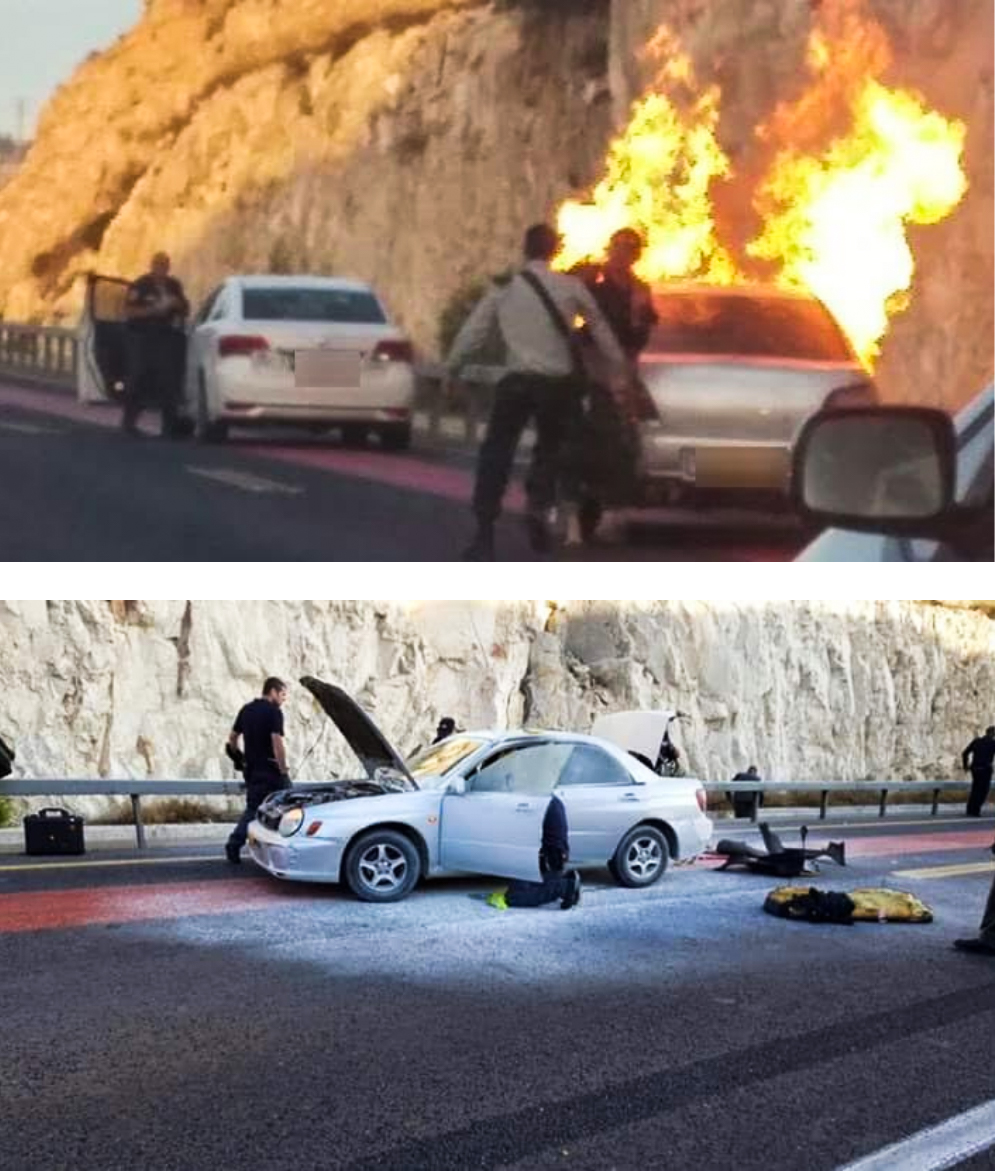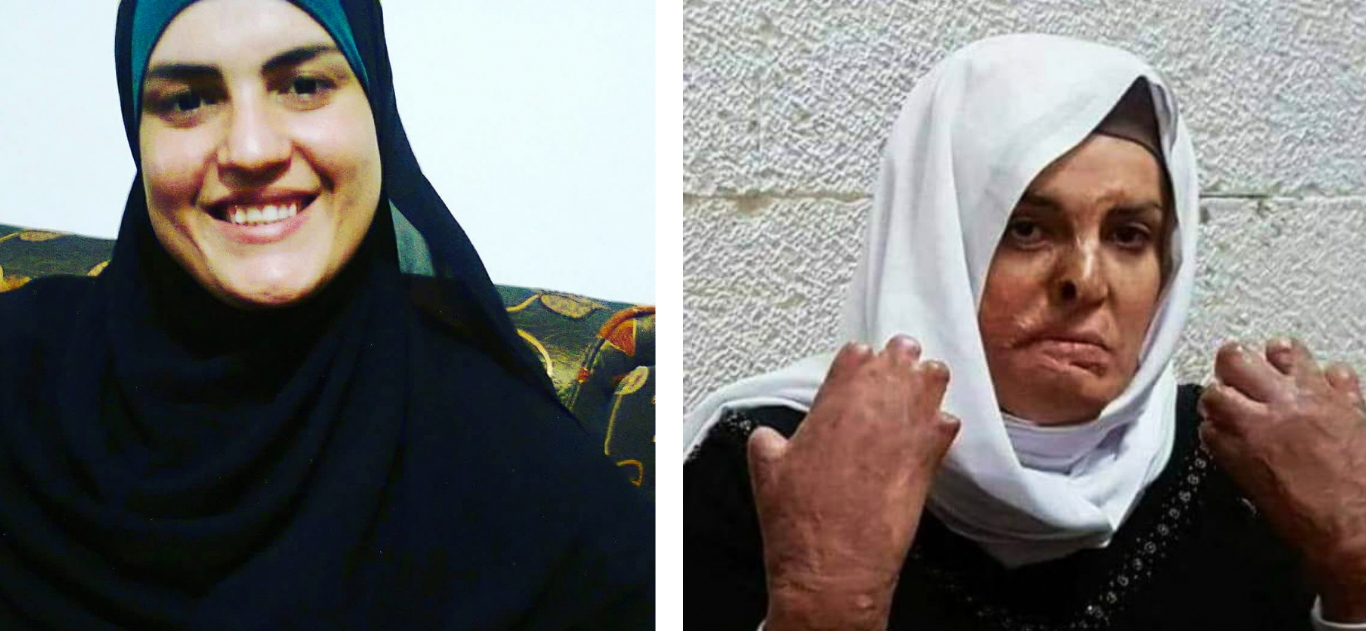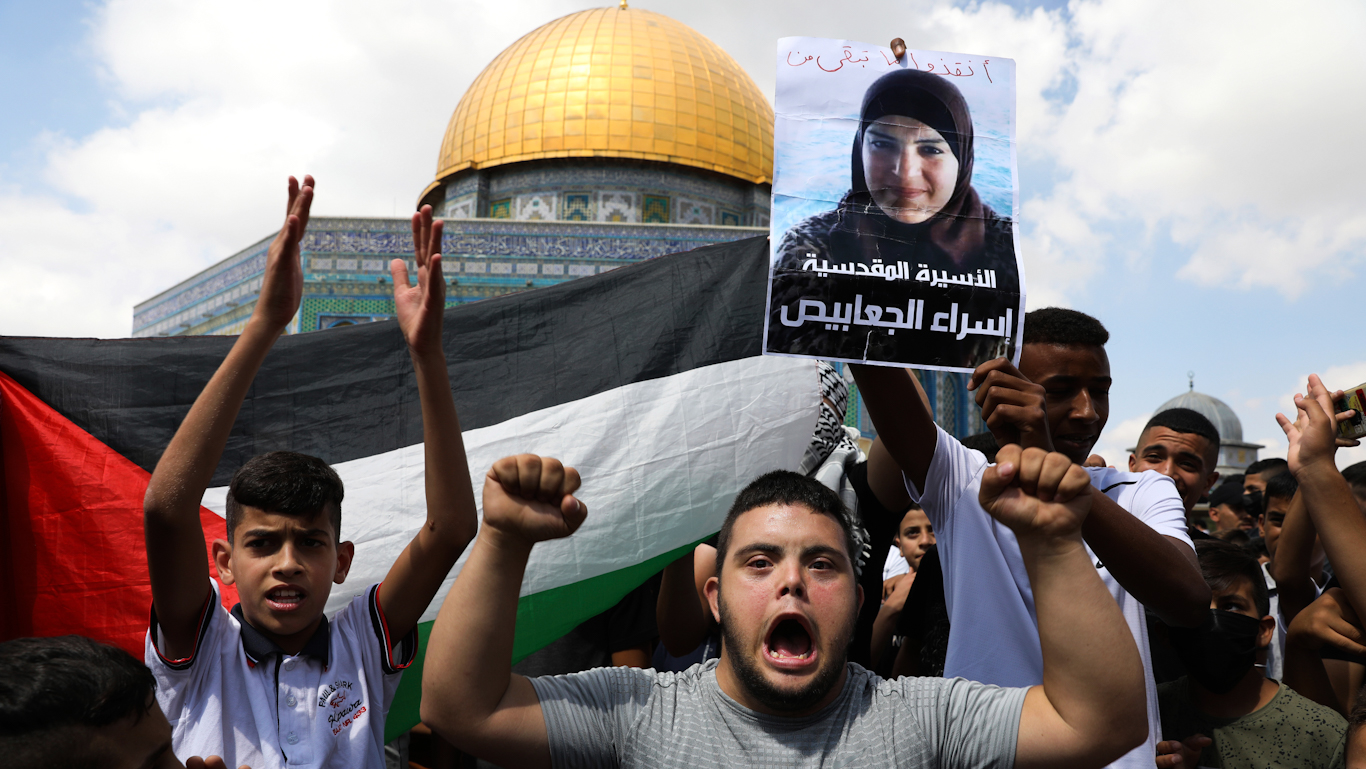OCCUPIED EAST JERUSALEM — In 2018, Palestinian prisoner Israa Jaabis appeared in court to appeal her sentence. Israa had been convicted of attempted murder — accused of blowing up her car near an Israeli military checkpoint — and sentenced to 11 years in 2016. The car accident left her completely disfigured, with first-, second- and third-degree burns on 50% of her body.
“Is there a pain greater than this?” Israa asked the press during the court hearing. “The pain is visible, and I don’t receive treatment.”
Now in 2021, Israa — still languishing in jail — has yet to receive several vital surgeries to ease her suffering.
The #SaveIsraa campaign
This month, Israa’s family, activists, and former detainees renewed the campaign to raise international awareness of Israa’s case and pressure the Israeli government to provide the 37-year-old mother with appropriate medical treatment. Under the hashtag “SaveIsraa,” social media users lambasted Israel’s gross medical negligence.
#SaveIsraa #انقذوا_اسراء_جعابيص
I miss you my son…#كاريكاتير_قدورة pic.twitter.com/sXmh6k9I1q— MAJHOOL (@MAJHUL28) September 12, 2021
No caption needed!
The picture explains Israel's crime with the Palestinian prisoner, Israa Jaabis. #SaveIsraa#FreePalestine#انقذوا_اسراء_جعابيص pic.twitter.com/zvm9Jt95Uw
— MAJHOOL (@MAJHUL28) September 13, 2021
For +6 years #Palestinian Israa Jaabis has been suffering in Israeli jails a deliberate medical negligence leaving her with unimaginable amount of pain from the burns that cover 60% of her body.
Israa is an icon to Palestinian struggle… #SaveIsraa pic.twitter.com/7RLU2Jaj7V
— Palestinian tweeter
(@tweet2palestine) September 5, 2021
No caption needed
#SaveIsraa#انقذوا_اسراء_جعابيص pic.twitter.com/gj89U5FD5I
— Motherland (@Motherl28134473) September 7, 2021
Eight of Israa Ja’abis fingers were amputated in the hospital. #SaveIsraa pic.twitter.com/Q19xkgXPrc
— V PALESTINE
(@V_Palestine20) September 6, 2021
In a statement, the campaign said Israa needs “a surgery to separate her burnt fingers, another to transplant skin that would cover exposed bones, and another to separate ears, which burnt and got stuck.” Additionally, Israa “cannot raise her arms because her underarm skin is stuck. She also needs surgeries to fix the skin around her right eye, nose, and lips.” Israa can’t breathe through her nose because of the burns on her face so she only breathes through her mouth.
According to Israa’s sister, Mona Jaabis, doctors estimate she needs between six to eight surgeries.
“The doctors said, ‘We need to see her to give an accurate number [of surgeries],’” Mona told MintPress News. “We’ve tried to send some specialist doctors inside the jail to meet Israa but our requests always get denied.”
In a video posted to social media, Israa’s 12-year-old son, Motasem Jaabis, appealed to the international community for help.
RT swilkinsonbc "Israa Jaabis's son appeals to the world to pressure the israeli regime to release his unjustly jailed injured mother #SaveIsraa | @OnlinePalEng pic.twitter.com/LQWq9w64KI"
— Richard Hardigan (@RichardHardigan) September 6, 2021
Holding a photo of Israa, Motasem said, “I’ve been deprived of my mom. I’ve been deprived of her for six years now. Whenever I return home, I don’t see my mother like any other child.”
“I’m calling upon the world to treat my mom,” he added.
The online campaign reached the streets of Gaza, where protesters stood in solidarity with Israa outside the Gaza City office of the International Committee of the Red Cross. Palestinian Health Minister Mai al-Kaila met with Mona on Sunday and assured her that the government is rallying the international community and human rights and health organizations to get Israa treated and released from prison.
The day of the accident
On October 11, 2015, Israa was driving home to Jerusalem from Jericho when her car caught fire nearly a mile from the Al-Z’ayyem checkpoint in East Jerusalem. The Israeli version of events accuses Israa of terrorism. Israel’s military prosecution even used some of Israa’s Facebook posts to validate allegations of “her having nationalistic motives for killing Israelis.” But Mona counters these claims, providing a very different narrative of that fateful day.
Before reaching the checkpoint, Israa entered a lane reserved for emergency vehicles and public transportation and pulled her car onto the side of the road, Mona told MintPress, continuing:
A [policeman] approached and told Israa, ‘You can’t park your car here.’ She responded that ‘There is a very bad smell. It’s bothering me so much inside the car and I can’t sit inside.’ He warned her again, but Israa said, ‘No, I’m not going back to the car, I’m just standing outside. I’m calling the police to come over right now.’ So he pushed her into the car and locked the driver door. A few moments later, the car started to burn. She was screaming to open the door, ‘I can’t breathe!’ By the time the police arrived, she lost her fingers and skin.”

The off-duty policeman was Sergeant Major Moshe Chen, a traffic cop on his way home from work when he spotted Israa. Israa’s family tried to file a case against Chen, but the police never granted them that option. Instead, the family was forced to pay the off-duty sergeant 5,000 shekels, or around $1,560, for his recovery
Mona said the fire was the result of liquid spilling from the driver’s seat airbag and causing the entire driver’s side to burst into flames. She added the police first declared the incident an accident but when a Shabak (Israeli internal security agency) officer arrived, it was labeled a terrorist attack.
Mona told MintPress that Israa’s lawyer disputed the terrorist allegations, describing how the car remained intact. “The lawyer said, ‘If she’s trying to blow up the car, then for sure the glass will be broken at least, but the glass is still there,” Mona said.
Israa was arrested the same day as the car accident and taken to Hadassah Ein Kerem Hospital in Jerusalem for treatment. She was transferred to al-Ramlah Prison Hospital in Ramlah, located northwest of Jerusalem, then to the HaSharon female prison in the central town of Even Yehuda. After her sentencing, she was moved to Damon Prison in the north, where she is currently being held.
A pattern of medical negligence
Activists and human rights organizations assert that Israel is deliberately neglecting Israa’s fragile health. Anat Litvin, director of the prisoners and detainees department at Physicians for Human Rights-Israel (PHRI), told MintPress that while Israa’s condition hasn’t worsened since her arrest, her injuries still need ongoing treatment and maintenance. “You need to treat the damaged area over the years because otherwise the tissue grows too fast and scars,” Litvin said.
According to Milena Ansari, the international advocacy officer at Addameer Prisoner Support and Human Rights Association, the Israel Prison Service (IPS) provides Israa only with painkillers in lieu of actual treatment.

“This is all part of the deliberate medical neglect policy that the Israeli occupation uses,” Ansari said. “They don’t feel like they have [an] obligation toward Palestinian detainees and prisoners regarding their health care.”
PHRI was in contact with the IPS to set up Israa’s surgeries, but the process is now at an impasse as the IPS hasn’t paid the hospital yet for the operations. The PHRI appealed to the Nazareth District Court two weeks ago over the issue and is awaiting a response. IPS did not respond to a request for comment.
The plight of Palestinian women in Israeli prisons
Owing to significant political pressure, Palestinian prisoner Anhar al-Deek was able to give birth outside of prison walls this month. She was granted a conditional release on 40,000-shekel (or $12,500) bail. While she is no longer behind bars in Damon prison, court proceedings continue.
Activists mobilized around al-Deek, emphasizing the inhumanity of shackling a woman to her bed as she gives birth. Anhar and Israa’s cases are not the exception but rather part of a systematic pattern of discrimination Israel enforces over Palestinian women in jail.
According to Addameer, 41 Palestinian women are in prison, including one in administrative detention, 26 serving sentences and 14 awaiting or under trial. Twelve of these women are mothers.
“Israel’s systematic policy of arbitrary arrests and administrative detention does include thousands of Palestinian women,” Ansari said. “So Israel does not discriminate with its arbitrary policies between Palestinian women or men or children or the elderly.”
Ansari emphasized, however, women face further discrimination inside Israeli jails, specifically when it comes to women’s concerns and needs. “We have documentation of a female student who was subjected to ill treatment and torture while she was on her period,” Ansari said, noting the Israeli authorities didn’t provide the student, Mays Abu Ghosh, with feminine hygiene products.
While all prisons are equipped with a medical clinic, this healthcare does not include gynecological services. Arabic-speaking, female medical specialists are also rare, as is culturally and religiously sensitive treatment. “It’s not only the arbitrary policies that are implemented on all Palestinians but also the gendered ones,” Ansari said.
A life once filled with hope
Israa’s life was once filled with hope. She worked in a nursing home and was a second-year student studying special education at Al-Ahliyya College in Jerusalem. She often dressed up as a clown at the Augusta Victoria Hospital in Jerusalem — putting a smile on the faces of sick children.
“Israa is a very powerful woman. She was doing a comedy show for kids and old people, so it’s very hurtful when we see her now,” Mona said. “But for me, nothing has changed because I love the soul of Israa. I don’t love her because of how she looked.”
Israa’s face is scarred. Her nose has a gaping hole. Her fingers are reduced to stubs. Her injuries have left her helpless, needing to rely on other prisoners to dress, eat and use the bathroom.
Motasem saw his mother last month. Israa’s sister, Batul Jaabis, last saw her in May. While the trip to and from Damon Prison takes around 12 hours, family visits only last 40-45 minutes.
“It’s a very hard feeling to see someone behind the glass, that you can’t hug or talk to that much,” Batul said. “We watch how she speaks, how she breathes, how she does everything because we just love her so much.”
Motasem wasn’t able to see his mom for the first year and a half that she was incarcerated. Before the accident, Israa was trying to get him a Jerusalem ID because she has one. After her arrest, that request was denied and he was no longer allowed to visit his mother. Motasem was finally granted permission to see his mom but then, three years into Israa’s sentence, he was again denied visits. He was eventually able to see her more regularly when he received a West Bank ID.
“It’s the same as every time,” Motasem said, referring to his August visit. “I miss hugging her, I just miss her so much. Even when we meet her, the glass is not that clean, so you can’t properly see the person who’s sitting in front of you. And the headphones aren’t that clear. It’s not a clear voice. You can’t hear very well.”
“I miss the time when I would come home from school and hug her and she’d do some comedy for me,” Motasem continued. Now, Motasem said, being without his mom is a feeling that cannot be described.
Feature photo | Protesters hold a Palestinian flag and a placard of prisoner Israa Jaabis, who suffers from severe burns and is fighting for medical treatment, during a protest in support of Palestinian prisoners at the Dome of the Rock Mosque in the Al Aqsa Mosque compound in in the Old City of Jerusalem, Sept. 10, 2021. Mahmoud Illean | AP
Jessica Buxbaum is a Jerusalem-based journalist for MintPress News covering Palestine, Israel, and Syria. Her work has been featured in Middle East Eye, The New Arab and Gulf News.


